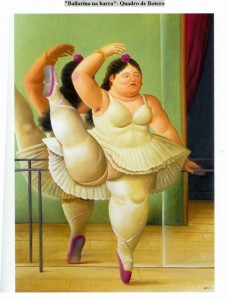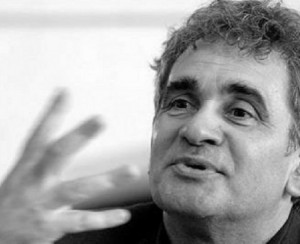“Pietá”
Bernardo ATXAGA
Mătuşile, ba chiar şi mamele noastre
N-au luat nici odată în seamă cât de importantă era viaţa
Înainte să împlinească şaizeci sau şaptezeci de ani,
Ca apoi, mirate fiind de o astfel de descoperire,
Să rămână năucite, preţ de câteva săptămani:
După care au uitat subit întâlnirile săptămânale cu familiile lor,
Şi au început să cumpere lucruri de care nu mai aveau nevoie
Şi să zbiere incontinu, la telefon,
De parcă Marţienii ar fi aterizat în pragul casei.
Mai apoi, simţindu-se obligate să recupereze timpul pierdut
Mătuşile, ba chiar şi mamele noastre
S-au înscris la cursuri de gimnastică aerobică,
La primăria din cartier: mă numesc Madam Cutare
Dar vă rog să nu-mi cereţi să vă spun vârsta.
Iar din momentul acela, au început dansul după isonul
Cadentelor, alergând înainte şi înapoi, sărind coarda şi ştacheta.
Un-doi-trei, capul sus, un-doi-trei, capul sus.
Centrul sportiv, dintr-odată a răsunat, în gol, de râsul lor.
Bine dresate de monitorul lor.
Au continuat, mai departe, să alerge înainte şi înapoi, sărind coarda şi ştacheta
Şi uneori chiar ieşeau împreună, la o agapă,
Schimbându-si treningul cu o rochie mai elegantă.
Pană când, intr-o bună zi, la micul dejun, s-au simţit, subit, năucite,
Leşinând în braţele unuia din copii,
Doar ca să-şi dea obştescul sfârşit a doua zi,
În timp ce suratele lor, de la centrul sportiv, continuau să cânte, mai departe,
Un-doi-trei, capul sus, un-doi-trei, capul sus.
Versiune în limba Română
de Constantin ROMAN
© Copyright Constantin ROMAN,
Londra, 26 August 2012
Pietá
Our aunts and our mothers too
never noticed how important life was
until they reached their sixties or seventies,
then, astonished by this discovery,
they went quite mad for a few weeks:
they forgot their regular Thursday date with their children,
they bought things they didn’t need from the supermarket,
they yelled down the phone, interminably,
as if they had spotted a UFO landing in the back garden.
Later, determined to make up for lost time,
Our aunts and our mothers too
Signed up for aerobic classes
Run by the local authority, ‘My name’s so-and-so,
But please don’t ask me my age.’
And from then on, they danced to the rhythm
Of the numbers, running up and down, whooping and jumping,
One Two Three and Stretch, One Two Three and Stretch.
The sports centre coldly gathered up their laughter.
Obedient to the teacher’s orders,
They continued their running up and down, their whooping and jumping,
And now and again they would all go out to supper together,
Abandoning their tracksuits for something more elegant.
Until, one day, they would come over all dizzy at breakfast
And collapse on top of one of their children,
And they would die some time later, early in the morning,
While their friends at the sports centre were still busily chanting
One Two Three and Stretch, One Two Three and Stretch.
Translated by Margaret Jull Costa
La Pietá, baina alderantziz
Gure izebak, eta gure ama maiteak berdin,
berandu ohartzen ziren bizitzaren garrantziaz,
hirurogeitamar urterekin, edo laurogeiekin,
eta txoraturik aurkikuntza latz hura zela eta
nahastuta ibiltzen ziren hainbat hilabetez,
bere semealabei bazkaririk prestatu gabe
supermerkatuan gauza xelebreak erosiz,
telefono dei amaigabeak nornahiri eginez;
etxe atarian ovni bat ikusi izan balute bezala.
Gero, denbora galdua eskuratu behar zutela eta,
gure izebak, eta gure ama maiteak berdin,
herriko udaletxeak antolatu gimnasia saioetarako
ematen zuten izena, “Urlia naiz, edo Sandia,
ez, ez dizut esango zenbat urte bete ditudan”;
eta handik aurrera oihuka, korrika, jauzika,
ematen zioten hasiera egunari, bat-bi, bat-bi,
bat-bi eta txalo, bat-bi, bat-bi, bat-bi eta txalo.
Polikiroldegiak hozki jasotzen zizkien algarak
Ikasle larderiatsuaren aginduetara makurturik
oihuka, korrika, jauzika jotzen zuten aurrera,
eta aldian behin afari bat egiten zuten denek
txandala kendu eta soineko dotoreak jantziz;
egun batean, azkenez, sukaldean txorabiatu
eta zerraldo erortzen ziren semealaben oinetan,
eta hantxe gelditzen ziren hilda beraien kideek
polikiroldegian gimnasiari ekiten zioten bitartean,
bat-bi- bat-bi, bat-bi eta txalo, bat-bi, bat-bi.
Una altra Pietá
Nuestras tías, y lo mismo nuestras madres,
reparaban tarde en la importancia de la vida,
nunca antes de los setenta o de los sesenta,
y estupefactas ante aquel descubrimiento,
perdían la cabeza durante varias semanas:
olvidaban la cita de los jueves con sus hijos
hacían compras tontas en el supermercado,
hablaban por teléfono a gritos, interminablemente
como si en su patio hubiesen visto un ovni.
Más tarde, dispuestas a recuperar su tiempo,
nuestras tías, y lo mismo nuestras madres,
daban su nombre para las clases de gimnasia
promovidas por el ayuntamiento, “soy Mengana
por favor no me pregunte la edad que tengo”;
a partir de entonces, bailaban al compás
de los números, dando carreras, chillidos, saltos,
Uno Dos, Uuno Dos Tres y Arriba, Uno Dos.
El polideportivo recogía sus risas con frialdad.
Cumplidoras fieles de las órdenes del profesor
seguían adelante con sus carreras, chillidos, saltos,
y de vez en cuando se marchaban todas a cenar
dejando el chándal y vistiéndose con elegancia;
luego, un día, se mareaban durante el desayuno
y caían redondas sobre uno cualquiera de sus hijos;
morían poco después, a primera hora de la mañana,
mientras sus amigas, en el polideportivo, coreaban
el Uno Dos, Uuno Dos Tres y Arriba, Uno Dos.






No Comments so far ↓
There are no comments yet...Kick things off by filling out the form below.